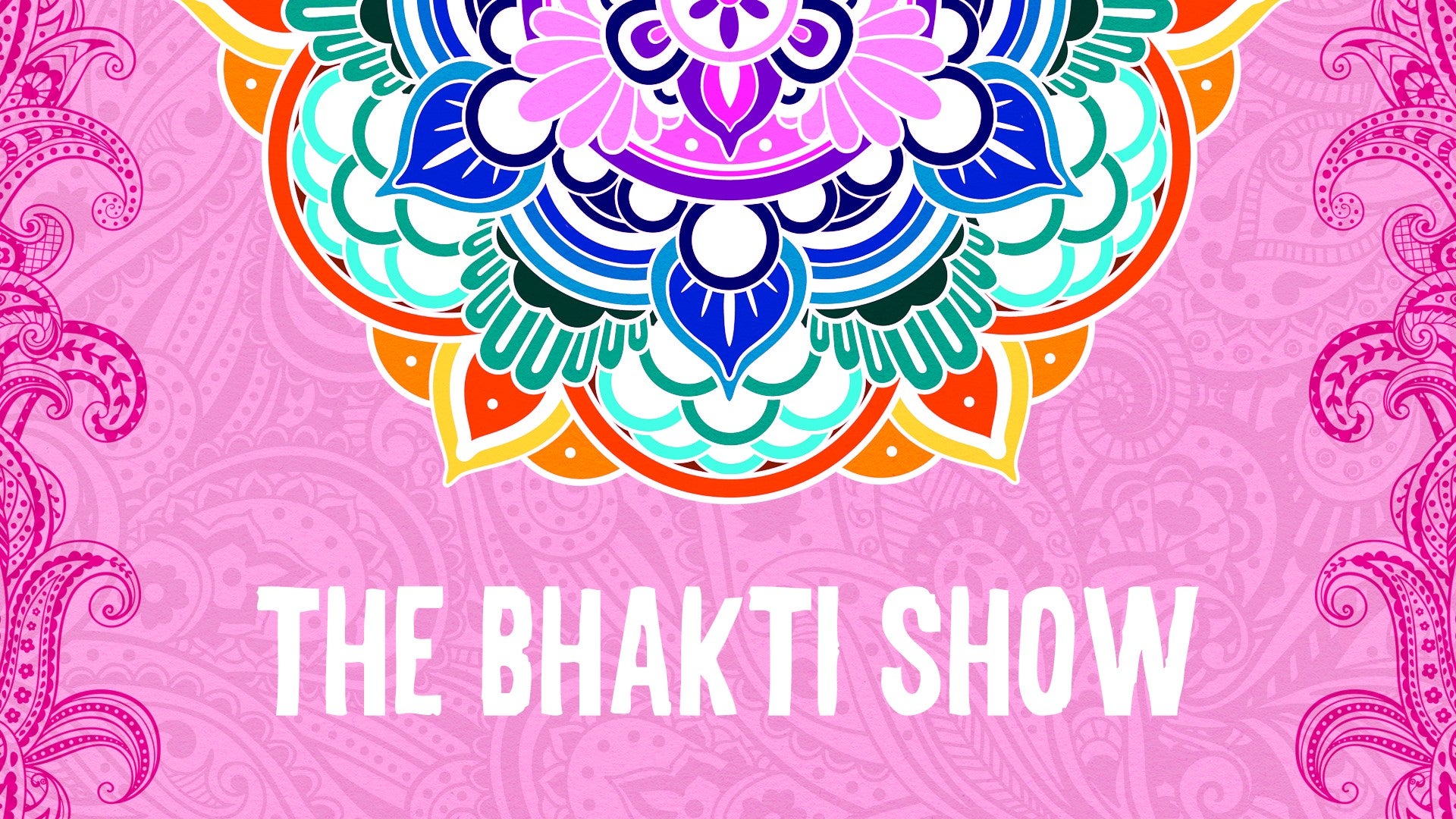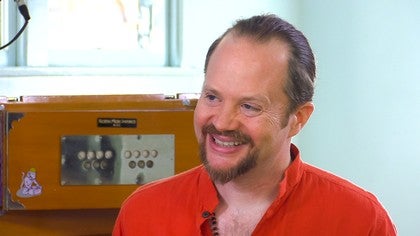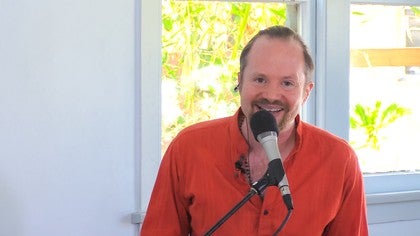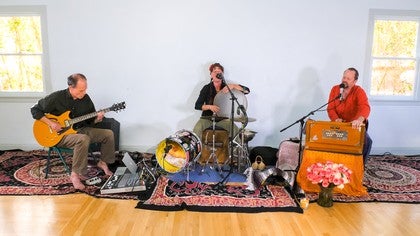Description
About This Video
Transcript
Read Full Transcript
Namaste, dear yogi friend. I'm so happy to be here today with Sean Johnson. Thank you, Sean, for being here. Thank you, Julian. Sean has been sharing Kirtan for over 17 years. He owns two yoga studios, Wild Lotus Yoga, in New Orleans, and he shares his love of play, creativity, song, poetry, art, yoga, with many, many people through training that he offers called Bhakti Immersion and Soul School and travels extensively singing with his band, the Wild Lotus Band. I love your new album, Unity, which is being released, has come out now and is being enjoyed by many people. The thing that I really appreciate about you is this beautiful sparkle in your eyes, light in your heart, and the sense of the eternal child. Thank you, Julian. Sweetness and joy, and so I'm really excited to be here just to ask you a little bit about your journey and the practices that keep you shining so brightly. What is Bhakti Yoga? Bhakti is a word that describes a universal human experience of opening the heart, of transforming whatever action we're engaged in as a prayer, as an offering, as a gesture of gratitude, as a vehicle to expand our heart and to, instead of suffocating our emotions, to actually stretch them the same way that we stretch our bodies and our breath when we practice Hatha Yoga, Asana. I feel like it's a universal experience that people from all different cultures experience in many ways through art. Not high art, but people's art. Singing a song and offering that song as a gift to someone else or to the world in gratitude, or telling a story, or making a painting, or cooking for others in service to others. Music and singing is one of the most incredible ways to awaken the heart. In some ways I like to think of Bhakti Yoga as the art of awakening the heart and the yoga of the heart. Most often it's translated as devotion, which in English word is challenging to get a grasp on. My favorite translation of Bhakti is participation, so how we can actually be more engaged in life and transform everything that we do into a kind of an act of prayer and gratitude. Perhaps you could just share a little bit about what drew you onto this path and to these teachings and this way of being. Well my first significant spiritual awakening was falling in love for the first time. That's an experience that just completely transformed my world view and opened up a whole other realm of possibilities for how I saw my life. My heart was just on fire and just blazing. I was in a long distance relationship with my girlfriend at the time. While we were apart from each other, rather than just feeling sorry for myself for being away from each other, I actually decided I wanted to try to figure out ways to channel that love that had been sparked from meeting this woman, how I could channel that into my life and the choices that I make and the other relationships that I choose. It felt like something that was catalyzed by this human relationship. So I started to really take a look at what my priorities were and how I was devoting my time and energy. I was on a fast track actually in broadcast journalism at the time and I let that go. I went to work at a daycare center. I dropped all of the college classes that I was supposed to take in the core curriculum and I started taking classes that I felt really resonant with and really passionate about like psychology of dreams and myth miracles and magic and myth in literature and film and electronic music. I just really reevaluated my whole life and interestingly that relationship which was really wonderful and we all can remember our first love and feel how that sparked us. It ended a few years later and that ending of that relationship was just as much of an initiation as the beginning, that first love, the heartbreak. So when I was honestly really heartbroken and really sad, I had to ask myself, well, where did that love go? Was it just something that existed in time when I'm with this person or is it something that's inside that can be accessed in other ways in addition to human relationships? I think this is one of the essential teachings in Bhakti Yoga is how we can work with love when we're feeling it, when we're feeling that connection and that bond and that union and then also when we're not, when we feel separate and instead of just feeling sorry for ourselves when we are feeling separate and detached, in Bhakti we actually work with longing, the thirst to love and to connect, the yearning as fuel and pouring that into an art form and so as human beings we all long for something and I think we all long for love in different ways. So Bhakti works with that experience of connection and separation and says both are incredibly important and we can work with both those experiences as yoga practices.
That's beautiful. That's really giving us space to be very human in our devotion, in our practice. It is, yeah, it is and in that broken hearted state that I was in, I was really more vulnerable than I'd ever been in my life before and it opened me up to yoga. I feel like I kind of repaired myself through different yoga practices and I really found when I discovered chanting that the practice of singing, which is something that I did a lot when I was a child, that it actually enabled me to exercise my heart and exorcise like a sponge, feelings that perhaps were stuffed inside me and then to just express that love and that longing and even the pain and the anger and everything else. So what's beautiful about Bhakti Yoga is it's a practice that gives us permission to be present in all the different dimensions of the human experience, in all the different ways that we can express ourselves through our heart and our emotions and doesn't make some of those feelings right or wrong. Which often happens in the spiritual path, sometimes there's this sense of I can't be angry or I can't be this or that, here is full permission. Exactly. There's a sense sometimes I stumble into it myself where I feel like I have to be, it's all love, it's all light, nice all the time. And I think if we're going to be really sincere and authentic and honest human beings, it's important for us to have places in our life where we can channel those darker emotions and express them in a conscious way. And music is one of the most potent ways to do that. And also storytelling is a really great way to catalyze those different voices that we have inside of ourselves. So the characters in the story and some of the myths that we share represent those different voices, different perspectives. And I feel like the demons, the demons, the archetypal symbol of the demons, they're most powerful. They have the most power over us when they're hidden in the dark. And when we can find ways to bring them out into the light and express that energy inside of us, it's very healthy and they're healing. So you just mentioned singing, you mentioned storytelling. Maybe you could just talk a little bit more about the specific bhakti practices that you share. Sure, sure. The bhakti practices that I have connected with most deeply in my life and practice first would be music. There's a practice called kirtan in bhakti yoga where you work with a mantra. And that word comes from a couple of Sanskrit words whose meaning is to liberate or to protect ourselves from the stormyness, the chaos of our own mind.
And so we work with a sound which is more than just a sound, it's an energy form. And we sing it repeatedly again and again and again. And it acts as a kind of point of focus as a staff that we can hold on to amidst the craziness of our own thoughts. And ideally the mantra soaks up all the other vibrations of the mind to the point where we feel more absorbed in that sound and creates this great sense of freedom and liberation and openness. And one of the most honest things that I think we can do as human beings is to sing. It's very easy to fake meditation. Inside I've got some violent fantasy happening, you know. But to sing commands that we be present, that we participate, you know. And so it's a really amazing way to be in the moment. So singing is an incredible kind of active meditation. And sound is amazingly powerful. It's a potency that we take for granted because we value in our culture mostly what we see. And you can't really see sound. But sound is so potent as a matter of fact at this very moment there are surgeries being done at hospitals all over the world using sound. Sound currents sent into the body to break up kidney stones, gallbladder stones and other blocks. So if we can sing a mantra, we have the capacity to break up tension, you know, in our body, stress and our emotions. And really release and create this wonderful state of spaciousness and openness. I play music with my band. We're a trio, Alvin Young and Gwendolyn Coleman. We've been playing together almost 10 years now and doing a lot of touring together. And our intention in sharing Kirtan music is to really make it something that feels like an honest expression of our musicality and where we come from in our life, which is New Orleans. And also create an experience that anyone can connect to. So an accessible kind of music that takes people on a ride, you know, through all the different corners of their heart. And that's dynamic, you know, that allows people to experience all these different human emotions and they get to really travel into the wilderness, you know, of their own heart and release whatever might be in there and connect to whatever's there. So music in Kirtan is a big part of Bhakti practice and teaching. Another piece that is not so commonly shared in the West as much is storytelling. And it's something that I love. Stories from all over the world have an incredible capacity to awaken our own inner story and help us to be more conscious of the plot of our own lives. If we can relate to a story and if we can tell a story in a way so that it feels really alive, it feels accessible, it feels like it's something that we can relate to, you know, in our day-to-day life, wherever we are, no matter what language we speak or what culture we live in, then the story has a power to awaken our imagination and inform, you know, our day-to-day life. So we like to tell stories and Alvin and Wendell and often accompany the stories, which adds a wonderful musical fabric to the experience. And one thing that I really love to do is in the spirit of the oral tradition, which is the most ancient teaching form, to tell the story in a little bit of a different way every time it's told, to embellish it a little bit. You know, it's what happens when we gather around the campfire and we tell stories and to really in some way place the story in the culture or the place that it's being told in so that folks can relate to it, you know, even more deeply. Other forms of Bhakti poetry, you know, poetry is just a beautiful way to take speech and words and to open the heart through those words and some of the greatest Bhakti poets, not necessarily existing only in the Indian tradition, you know, Rumi from the Sufi tradition and Mirabai from the Hindu tradition and Kabir who really hugged the Hindu and the Muslim traditions. And then we have great poets from the Christian tradition, St. John of the Cross wrote some beautiful poetry and some more contemporary poets like Mary Oliver and David White are just writing amazing little nuggets of poems that, you know, you read them and they just awaken something, you know, inside of us that allows us to to kind of peel away a numbness, you know, and see into the world with clearer eyes, you know. So poetry is a big piece and then another piece is food. One of the root words of Bhakti means to feed. So Bhakti yoga is very much about how we feed ourselves both with actual food and nourishment so it could be making a beautiful meal for someone who you love and offering that to them. But we can also reflect on the analogy of food, you know, and how we feed our souls and feed our heart and what activities we might engage in, the people that we might choose to hang around that help to feed and nourish and bring that sense of abundance to our lives. One of the things that I've been really playing with a lot is how we can experience hatha yoga asana practice as a form of bhakti yoga. They're not always taught together, they're not always integrated and so we offer a practice called bhakti on the mat which is an experiment in how to integrate bhakti yoga and hatha yoga. So we do storytelling and chanting and then once people come on their mats it's a slow vinyasa yoga practice that really seeks to transform the postures and the vinyasas into living and moving rituals that help us to connect more deeply to meaning in our lives. So you're in bridge pose and you're meditating on a bridge that you want to create in your life, a connection you want to make in your life or you're folding into uttanasana and you're diving into your being or into, you know, some element of the story that we told earlier. So it's an experience of really infusing the practice with more meaning. The word ritual lives inside that word spirit ritual and it's anything that we do that transforms something ordinary and mundane into something extraordinary and amazing. So I have a question as a fairly new yoga teacher. Perhaps, you know, as we start to come into these practices of bhakti there's a natural desire to share that with others and I feel like the asana practice is very commonly accepted and but these practices of kirta and not singing are fairly new and do you have any sort of hints or tips for, you know, people who are wanting to share this more with the mainstream and and how to kind of introduce it gently so that people will respond, you know, in a positive way and start to get a taste of it without kind of scaring people off. Sure, sure. Well we live in the deep south, yeah, New Orleans and we travel around to Mississippi and Alabama and these are places where there are more conservative communities and there's a real, I feel like as yoga teachers we should be very responsible for the words that we choose and the way that we communicate some of these practices and in a way if we're more conscious of the way that we're sharing these practices in a more accessible way that anyone can relate to no matter what their belief system is whether they're christian or muslim or hindu or jew or agnostic or atheist then there's the chance that at all land, you know, and that will truly be educating our students about, you know, what we're sharing so the key is to find what's universal in these teachings and to stay away sometimes from the cultural baggage, the superstitious pieces, it's a matter of discernment and to really try to find the archetypal power, you know, in the teaching and to relate it to that moment, that community, you know, that time so as an example, you know, we love to share stories and there's a goddess in the, you know, from the from the indian mythology called Saraswati and she's the goddess of music and art and creativity and imagination, wisdom, science and so we can take that power and we can say all right well Saraswati traditionally looks like this she's a beautiful indian woman wearing a sari playing her vina by the river side and she represents all these things but to you she might look differently she might look like madonna or bonnie reidt or your favorite writer or poet or filmmaker, you know, albert einstein your favorite thinker, you know, ted talks remind me of Saraswati, you know, so bringing up some things that folks can relate folks can relate to so it's not just presented within the circle of a single culture, you know, and so when we bring up these other analogies, you know, I think people's ears perk up, you know, as far as the sonic practices of bhakti yoga I like to remember that people who practice asana they're there because they relate to the world through their bodies kinesthetically it's one of the reasons why they love asana practice so I like to share ways that show and give people the experience of chanting as a physical physiological experience so we put our hands on our chest and we just chant you'll feel your sternum buzzing and humming, you know, we put our hands on our head and we sing you'll feel your cranium your jaw bones your cheeks just humming with that sound and we do it you know and you'll feel the base of your body and what's great about these simple vowel sounds is they're not attached to a particular language, you know, a particular culture it just sounds and we give people the opportunity to experience these sounds in the lab, you know, of their own body so that's a really great way to make a connection I feel so strongly that the world really is been it can benefit from some bhakti at this time with all that's going on there's so much suffering and disease and so these practices we've been talking about, you know, as being really beneficial for us as individuals and it seems that it's also you know as we do them we are we're really changing the world and I guess my final question to you is with all that's going on what do you think the one thing that each of us can do to contribute to to making this world, you know, a better place and to bringing more peace into into what we're experiencing collectively, what's your, you know, little nugget of of the essence of what we can do to contribute? Love.
Love, yeah we just have to find ways to to love more and bring more love into the world and and less judgment. I think there's a value to constructive criticism for sure but so often the way we speak causes a lot of suffering and perhaps even is the seed for a lot of the big major conflicts that we have in the world right now is the way that people are speaking to each other, the judgment in their language and the the wounds that are created by that unconscious discourse, words that come from an angry hurt place and so if we can be more conscious of the way that we express ourselves, the way we speak, which I think is one of the most powerful yoga practices and one that's underrated in the west, the yoga of speech, how we communicate, the words that we choose, the tone and the feeling in our voice as we speak to each other, I think that if we're all more conscious of that then it would help a tremendous amount and the sonic practices of bhakti yoga help us to be more aware of that, the power of our voice, the way that we communicate in the moment, you know, in whatever we're doing so that would be that's what comes to mind right away. Sean thank you so much. Thank you Julia. Really a pleasure to be here with you today. Thank you so much. Yeah. Blessings to you dear yogi friend, I hope that you enjoyed this as much as I did and sing your heart out. Namaste. Thank you Sean. Thank you Julia. Namaste. Namaste.
The Bhakti Show
Comments
You need to be a subscriber to post a comment.
Please Log In or Create an Account to start your free trial.








xo
Katherine